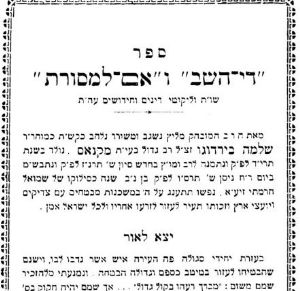A Short Tribute
Hacham Shlomo Birdugo, son of Hacham Yehuda, was born in 1853 in Meknes, Morocco.
He was appointed as a rabbi and halakhic adjudicator in Meknes in 1897. Known as one of his city's pure souls, he was imbued with a love for the Jewish people and all human beings, and was a cultured and accomplished individual. As a judge and educator, he was famous for his clear and untainted language, and would write poetry and compose liturgical songs to arouse the hearts of the public.
Hacham Shlomo Birdugo married Jamilla, daughter of Hacham Yosef Hacohen, and the couple had sons and daughters born to them.
Hacham Shlomo Birdugo passed away on 1 Nissan, 5666 (1906). He authored Yada DeTabha – halakha and religious practices concerning treifot [unclean foods], and some of his Responsa were published in BeShufra DeYosef. After his death, his son, Yaakov Birdugo, had his original commentary published in a book entitled Dei Hashev VeEm LaMasoret.
A few quotes from the Rabbi on 'Tzedakah and Healing' in which he teaches of the attribute of charity as being affordable yet unlimited in its reward
Charity is a commandment that has no limit in its reward, a commandment from which a person benefits in this world and the value of which is carried over to the World-to-Come, as the Tanah wrote. A person should be vigilant concerning this commandment, for since it is not an unaffordable expense, the punishment for carelessness is compound. Our Sages, of blessed memory, went to great lengths concerning this mitzvah and extended its worth, by saying that it is one of the world's three fundamental pillars. A discerning intelligence immediately points to the fact that the world's existence depends mainly on charity…lending to poor people and soothing them with gentle speech. For if one does not lend to them and appease them, they may die of hunger. By visiting the sick, or in helping by locating and bringing medicine one may be the agent that heals; or burying the dead, who would otherwise be abandoned on the ground. And there are many similar matters. Therefore, beyond the simple understanding of our Sages' words … we can say that the world's existence, in a natural sense, depends on charity.
Dei Hashev VeEm LaMasoret, p. 77b, Yehuda Razzon Press, Casablanca, 1950
